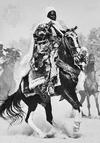- Fulani
-
1. Also, Fulah. a member of a pastoral and nomadic people of mixed African and Mediterranean ancestry, scattered through W Africa from Senegal to Cameroon.2. the language of the Fulani, a Niger-Congo language closely related to Wolof.
* * *
Primarily Muslim people, numbering about 18 million, found in many parts of West Africa, from Lake Chad west to the Atlantic coast.Their language is Fula, an Atlantic language of the Niger-Congo family. Originally they were herders, but interaction with other groups produced marked cultural changes. In the 1790s the Fulani priest Usman dan Fodio led a holy war (jihad) that created a large empire. Its decay in the 19th century aided the establishment of British rule over northern Nigeria. Many Fulani of northern Nigeria have adopted the Hausa language and culture and established themselves as an urban aristocracy. Fulani chieftain riding up to salute the emir of Katsina at the end of the Muslim festival of ...Ken HeymanRapho/Photo Researchers
Fulani chieftain riding up to salute the emir of Katsina at the end of the Muslim festival of ...Ken HeymanRapho/Photo Researchers* * *
▪ peoplealso called Peul or Fulbea primarily Muslim people scattered throughout many parts of West Africa, from Lake Chad, in the east, to the Atlantic coast. They are concentrated principally in Nigeria, Mali, Guinea, Cameroon, Senegal, and Niger. The Fulani language, known as Fula, is classified within the Atlantic (Atlantic languages) branch of the Niger-Congo language family.Interaction of the widely dispersed Fulani with disparate other groups has produced a variety of socioeconomic patterns. The Fulani were originally a pastoral people, and their lives and organization were dominated by the needs of their herds. The pastoral Fulani today enjoy greater prestige than town and sedentary agricultural Fulani as the most truly representative of Fulani culture. Interaction with other groups has sometimes resulted in a considerable degree of cultural absorption. This is most notably the case in northern Nigeria, where perhaps half of the Fulani have adopted the Hausa language and culture and where, as a result of a series of holy wars (1804–10) purporting to purify Islam (Islāmic world), they established an empire, instituting themselves as a ruling aristocracy. The urban Fulani are the most ardently Muslim; pastoral Fulani are frequently lax and sometimes even nonpracticing. The pastoralists also exhibit a much greater variation of physical traits. They wander in nomadic groups, making temporary camps of portable huts. Some of their dairy products are exchanged at markets for cereal foods; cattle are rarely killed for meat. Many sedentary Fulani, who frequently have become sedentary as a result of the depletion of their herds, also own cattle, but they rely principally on cultivation.The social structure of the pastoral Fulani is egalitarian, in marked contrast to that of other Muslim groups, such as the Hausa, and to most sedentary Fulani. The influence of Islam on kinship patterns is evident in the general preference for cousin and other intralineage marriages. Most men are polygynous, the typical household unit comprising the family head, his wives, and his unmarried children.* * *
Universalium. 2010.
